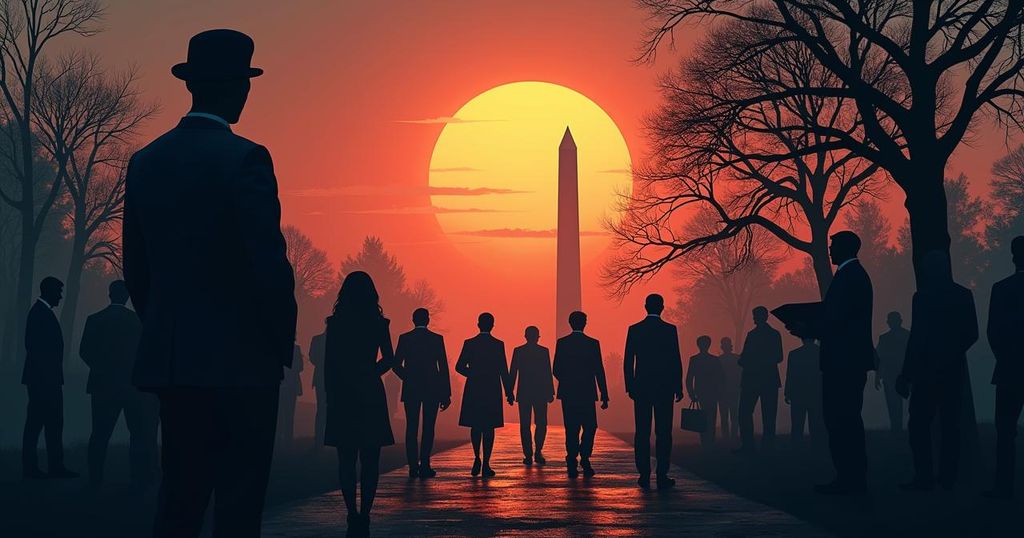The Political Landscape of Hurricane Milton: A Prelude to Electoral Maneuvering
As Hurricane Milton approaches Florida, a political battle intensified wherein Vice President Kamala Harris seeks to manage the narrative against Donald Trump, who aims to leverage the storm for political gain. Both leaders navigate the complexities of disaster response within the context of the upcoming presidential election, highlighting how storms can serve as critical political battlegrounds influenced by historical precedents and media messaging.
Prior to Hurricane Milton making landfall on the Florida coast, a vigorous political battle had already commenced, reflecting the contentious atmosphere surrounding this potentially devastating storm. With its implications linked to climate change, the intensity of the situation ought to transcend political agendas. However, given the impending presidential election and the presence of a politically ambitious figure such as Donald Trump, the storm has become a focal point of partisan conflict. Typically, the aftermath of hurricanes incites political reactions; however, Trump’s recent actions during Hurricane Helene have prompted early political posturing regarding Milton. For Vice President Kamala Harris, the storm presents an opportunity to demonstrate leadership while navigating the challenges of federal disaster response and media scrutiny. Nonetheless, she risks the repercussions of any perceived inadequacies in rescue efforts, particularly with Trump poised to disseminate misinformation. In an effort to preempt Trump’s narrative, Vice President Harris addressed reporters, asserting that the former president has been sharing misleading information about federal aid. “It’s about him, it’s not about you,” she articulated, further emphasizing the necessity of genuine leadership during crises. Federal officials, including FEMA Administrator Deanne Criswell, echoed Harris’s sentiments, cautioning against Trump’s rhetoric that could instill fear regarding governmental assistance during an emergency. Concurrently, the White House has adopted measures to counter misinformation by establishing a presence on social media platforms like Reddit. President Joe Biden’s engagement with Hurricane Milton may represent the concluding significant national emergency of his administration. His decision to postpone a foreign trip underscores the urgency of safeguarding the American populace in the face of natural disasters. Biden’s management of this situation carries the additional weight of preserving his administration’s legacy and ensuring support for his vice-presidential successor, Harris. Hurricane Milton’s political ramifications extend beyond immediate disaster management. Trump has consistently demonstrated his willingness to exploit national emergencies for political leverage, using past disasters as examples to critique the Biden-Harris administration. His assertions regarding governmental failures, while often unfounded, resonate with a segment of voters, contributing to his polarizing narrative that positions him as a challenger to perceived incompetence. Historical precedents from previous hurricane responses have significantly influenced political landscapes. The disastrous management of Hurricane Katrina under President George W. Bush, contrasted with Obama’s effective handling of Superstorm Sandy, serve as benchmarks shaping public perception and electoral outcomes. Similarly, Florida Governor Ron DeSantis faces a delicate balance between engaging with Biden’s administration for effective disaster response while avoiding unnecessary political risks, particularly concerning Harris. DeSantis accused Harris of politicizing the disaster, stating, “She is being selfish by trying to blunder into this when we’re working just fine,” highlighting the fraught relationship between local and federal leaders amid crises. Biden, however, acknowledged DeSantis’ cooperation, emphasizing readiness to assist Florida amid the storm’s approach. The current political landscape surrounding Hurricane Milton illustrates the complex interplay between natural disasters and partisan politics, revealing how leaders navigate both the responsibilities of office and the demands of their respective political arenas.
The article delves into the emerging political discourse surrounding Hurricane Milton, a potentially significant natural disaster anticipated to strike Florida. With the presidential election looming, the impact of the storm on political narratives is heightened, particularly concerning the actions and words of notable figures such as Donald Trump and Vice President Kamala Harris. Previous hurricanes serve as context for the political ramifications linked to federal responses, showcasing the historical influence of disaster management on electoral fortunes and public perception of leadership.
The discourse surrounding Hurricane Milton exemplifies the intricate relationship between natural disasters and political maneuvering. With figures like Trump capitalizing on crises to challenge incumbent leadership while Harris aims to solidify her credentials, the storm’s implications extend far beyond weather patterns. The ongoing struggle for narrative control reflects broader themes of governance, accountability, and public trust in governmental institutions as they respond to emergencies.
Original Source: www.cnn.com




Post Comment